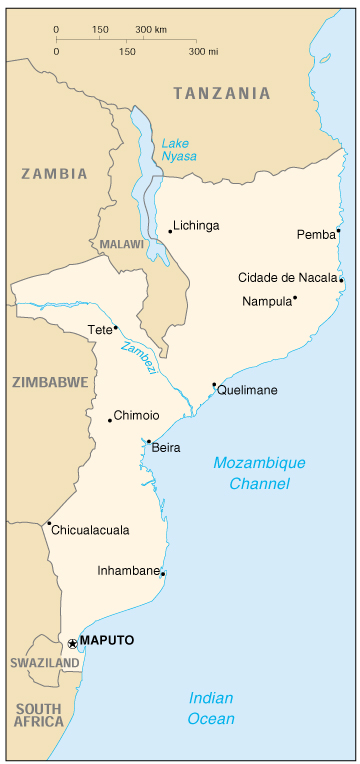

Status Quo Side: Mozambique Frelimo government
Non-Status Quo Side: Renamo opposition
Region: Africa
Conflict Type: External Intervention
Issues in Dispute: Governance, Strategic
The overthrow in 1974 of dictator Antonio de Oliveira Salazar ended Portugal's centuries of colonial presence in Africa. Mozambique's Frelimo nationalist opposition declared independence as a Marxist-Leninist state in 1975. Portuguese colonists fled with virtually all the skills needed to rebuild a country devastated by decades of fighting. The pro-Soviet orientation, together with Frelimo's domination by Maconde groups in the north and its long-standing hostility toward the colonists and the white-minority-ruled Rhodesia and South Africa, underlay several sources of opposition to Frelimo.
Frelimo's hostility to neighboring white minority governments was manifested in support for ZANLA (the Zimbabwean nationalist guerrillas in Rhodesia) and the ANC (African National Congress in S. Africa). Rhodesia arranged to consolidate opposition to the Frelimo by the Renamo (Mozambique national resistance) movement which conducted raids within Mozambique. Frelimo forces attacked Renamo strongholds within and outside Mozambique territory.
The conflict escalated to full-scale guerrilla war. After Zimbabwean nationalists took control in 1980, Renamo relied primarily on South African support to wage a very successful campaign , so successful that on March 16 1984 Presidents Samora Machel (Frelimo) and P.W. Botha (South Africa) signed the Nkomati agreement halting support to the ANC on the one hand, and Renamo on the other. South Africa evidently continued to support Renamo. The level of hostility remained high with an estimated 100,000 killed from 1984-88 and 300,000 dead from starvation.
The war's intensity war lessened. Frelimo's Marxist orientation with its Soviet support had waned, along with South African and US support for Renamo. Frelimo's draft constitution in July 1989 paved the way for a multiparty sytem. Direct negotiations between the leaders in July 1990, mediated by the Italian government and Catholic Church officials, achieved partial agreement on cease-fire in December, but covert support for Renamo continued from South African special forces, Kenya, Malawi, and right-wing interests in South Africa, Europe and the US. A peace agreement was finally signed on October 4 1992, and a cease-fire on October 16. A UN peacekeeping force of 7,500 arrived in mid-December to supervise demobilization, followed by 2400 international observers to supervise elections on October 27-28, 1994.
The multi-party election results were certified as "free and fair" on November 19, a new assembly was installed on December 8 and President Joaquim Alberto Chissano (Frelimo) took office the following day.